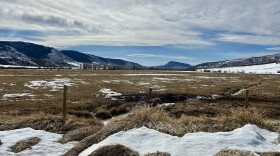-
The Fetcher ranch in northwest Colorado is on the frontlines this year of record-low snowpack across the West. It's adding a sense of urgency among seven states to finalize a plan for how to conserve the dwindling Colorado River.
-
State funding supports weed control efforts to protect farms, habitat and water.
-
New trade and regulatory moves could shape cattle markets and farm equipment repairs.
-
New World screwworm and Asian longhorned ticks threaten livestock as the Southwest faces megadrought, low snowpack, and declining Colorado River water levels.
-
Farm leaders question whether Trump’s tariffs are helping or hurting U.S. farmers as rising input costs and global competition reshape agriculture and trade.
-
Farm News & Views reports falling snowpack in southwest Colorado river basins and growing strain on U.S. farmers from low crop prices, high costs, and trade impacts.
-
The announcement from Parks and Wildlife on Wednesday came three months after the Trump administration blocked Colorado's original plan to capture a second batch of wolves in British Columbia and fly them to the state.
-
Farm leaders warn of mounting losses as trade tensions, global beef markets, and low snowpack threaten agricultural stability heading into 2026.
-
Farm News & Views examines USDA staffing losses, rising production costs, global market shifts, and trade challenges shaping agriculture in 2026.
-
This week on Farm News & Views, Bob Bragg looks at the rapid rise of agricultural drones and the impact of a new federal ban on foreign-made models, examines a UN report showing a slowdown in global food production, and closes with a reflective story about perspective, compassion, and the lessons we learn along the way.

Play Live Radio
Next Up:
0:00
0:00
Available On Air Stations




